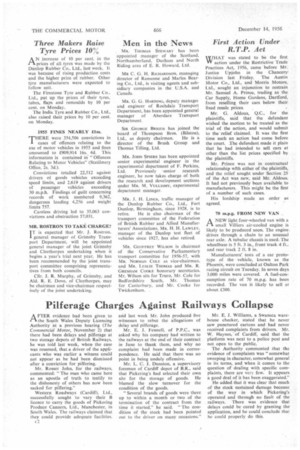Pilferage Charges Against Railways Collapse
Page 42

If you've noticed an error in this article please click here to report it so we can fix it.
A FTER evidence had been given to the South Wales Deputy Licensing Authority at a previous hearing (The Commercial Motor, November 2) that there had been delays and pilferage at two storage depots of British Railways, he was told last week, when the case was resumed, that a driver of the applicants who was earlier a witness could not appear as he had been dismissed after a conviction for pilfering. Mr. Rosser John, for the railways, commented: "The man who came here as an apostle of truth to testify to the dishonesty of others has now been sacked for pilfering." Western Roadways (Cardiff), Ltd., successfully sought to vary their B licence to carry the goods of Pickering Produce Canners, Ltd., Manchester, in South Wales. The railways claimed that they could provide adequate facilities.
c2
and last week Mr. John producedfive witnesses to rebut the allegations or delay and pilferage. Mr. E. J. Fennell, of P.P.C., was asked why his company had written to the railways at the end of their contract in June to thank them, and why no complaint had been made in correspondence. He said that there was no point in being unduly offensive. Mr. L. C. J. Dunston, a supervisory foreman of Cardiff depot of B.R., said that Pickering's had selected their own site for the storage of goods. He blamed the slow turnover for the condition of the goods.
"Several brands of goods were there up to within a month or two of the termination of the contract from the time it started," he said. "The condition of the stock had been pointed out to the driver on many occasions." Mr. E. J. Williams, a Swansea warehouse checker, stated that he never saw punctured cartons and had never received complaints from drivers. Mr. W, Haynes: of Cardiff, said that the platform was next to a police post and not open to the public.
The Authority commented that the evidence of complaints was "somewhat sweeping in character, somewhat general in its terms, and when it comes to the question of dealing with specific complaints, there are veil few. It appears a good deal of it has been exaggerated."
He added that it was clear that much of the stock sustained damage because of the way in which Pickering's operated and through no fault of the railways. There was evidence that delays could be cured by granting the application, and he could conclude that he could properly do this.
















































































































